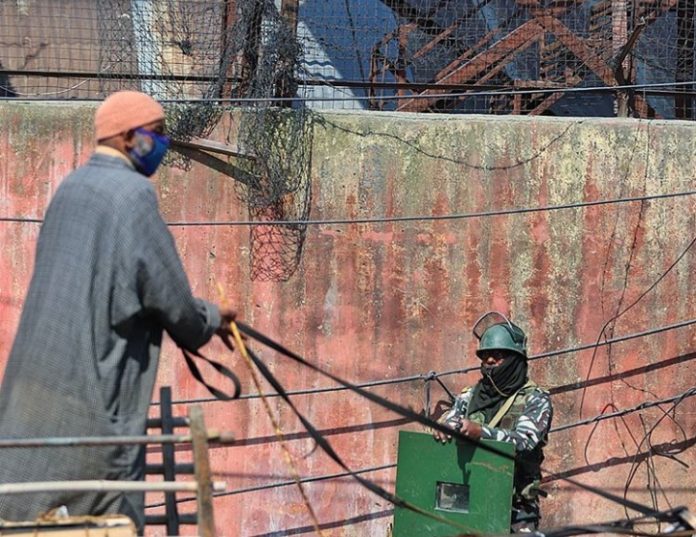As COVID-19 brought the world to a halt, troubles faced by the people in Kashmir can be imagined, though to a much lesser extent
By Dilisha Saboor Kidwai
Rida (name changed) recalled how Jammu and Kashmir (JK) gasped in fear on 4th August 2019 when the phone lines and internet services were suspended without the circulation of reasons behind the move. “Hum sab dare hue the ki kuch bahot bada hone wala hai” Rida told me. It was a day before the Upper House of the Indian Parliament would pass a resolution to turn down the conditions of the Instrument of Accession under which JK joined the Indian Union in October 1947. On 5th August 2019, Article 370 of the Indian Constitution was scrapped. Rida is a Kashmiri I went along for a walk in our college campus in Aligarh.
I can’t agree more when Arundhati Roy writes that “the government has gone rogue”. Indian Prime Minister Narendra Modi called Article 370 as a hurdle in the development of Kashmir. Ironically he himself ended up shutting down the entire state for six long months. “The rights enjoyed by the daughters of other region were not enjoyed by the daughters of Jammu and Kashmir” he further said in his address to the nation after the abrogation of Article 370. If the idea was to win the people of Kashmir then they should have been given the chance to tweet about it, at least. History would remember the world’s largest democracy for the longest internet blackout.
To a question of how this loss of connectivity would have impacted the people of JK mentally, Rida replied, “Itna kuch dekha hai ki isse farq nahi padta tha ab.” A sense of betrayal was evident in her reply. I remembered how I cursed the authorities during a 24 hours internet shutdown in Aligarh after the Ayodhya verdict was delivered by the Supreme Court, and the troubles I faced in a six-day long internet blackout after violence that broke out in Delhi and in Aligarh in March 2020.
Even on 15th December 2019 we were deprived of internet in Aligarh before we could recognize that the voice of explosions were not of crackers but stun grenades being employed by the security forces to crush the peaceful protest by students of Aligarh Muslim University (AMU) against the Citizenship Amendment Act (CAA) 2019. Aligarh had not been to what Kashmir had been, but we just had a glimpse of that fear, though to a lesser extent.
Rida explained me how people had to stand in long queues outside the police stations to make a call of less than a minute during the months followed by the abrogation of article 370. This was Kashmir in the 21st century while the rest of the world steps into 5G network.
The people might have gathered the mental courage to survive without the internet, but that cannot compensate their economic losses. Kashmir Chamber of Commerce and Industries (KCCI) revealed in December that Kashmir’s economy has seen a loss of Rs 17,878 crores. The journalists, businessmen, handicraft and tourism sector and students have been badly affected by the shutdown. “My cousin who is pursuing masters didn’t have a class for a single day, had to take exams anyway” Rida told me. Javid Parsa, a young entrepreneur from JK, told the world through social media about how he had to travel for hours to get an OTP to pay his tax.
“Kashmir ujad chuka hai, normalcy namumkin hai ab” Rida said. She then questioned me “Home is the safest place you would consider, right?” I nodded. “But what would you do if the tear gas shells are fired in your own home? And you see your people being picked up and beaten? Kaise nahi khaulega ye khun phir?” The intensity with which her world hit me should hit to the people in power who are trying to portray this reality as ‘normalcy’. Rida’s words reminded me of the newspaper cutting I saved in my diary in 2017. It was a case of unjust targeting of a Kashmiri student of AMU, for which he had to pay with 17 years of his life in jail waiting to prove his innocence in numerous terror cases.
When the rage hits the youth to leave the comfort of their cozy rooms and pick up the arms against the state, it speaks volumes about how the state has failed its people. The Human Rights violations and the denial of justice to the victims, as in the cases of Kunan-Poshpora and Sopore Massacre remains a blot on the democracy of India. According to a report by Office of the of the High Commission for Human Rights (OHCHR) of United Nations (UN), India’s Armed forces Special Power Act (AFSPA) “remains a key obstacle to accountability”.
Rida likes Aligarh for not having a drone over her head, unlike Kashmir.


